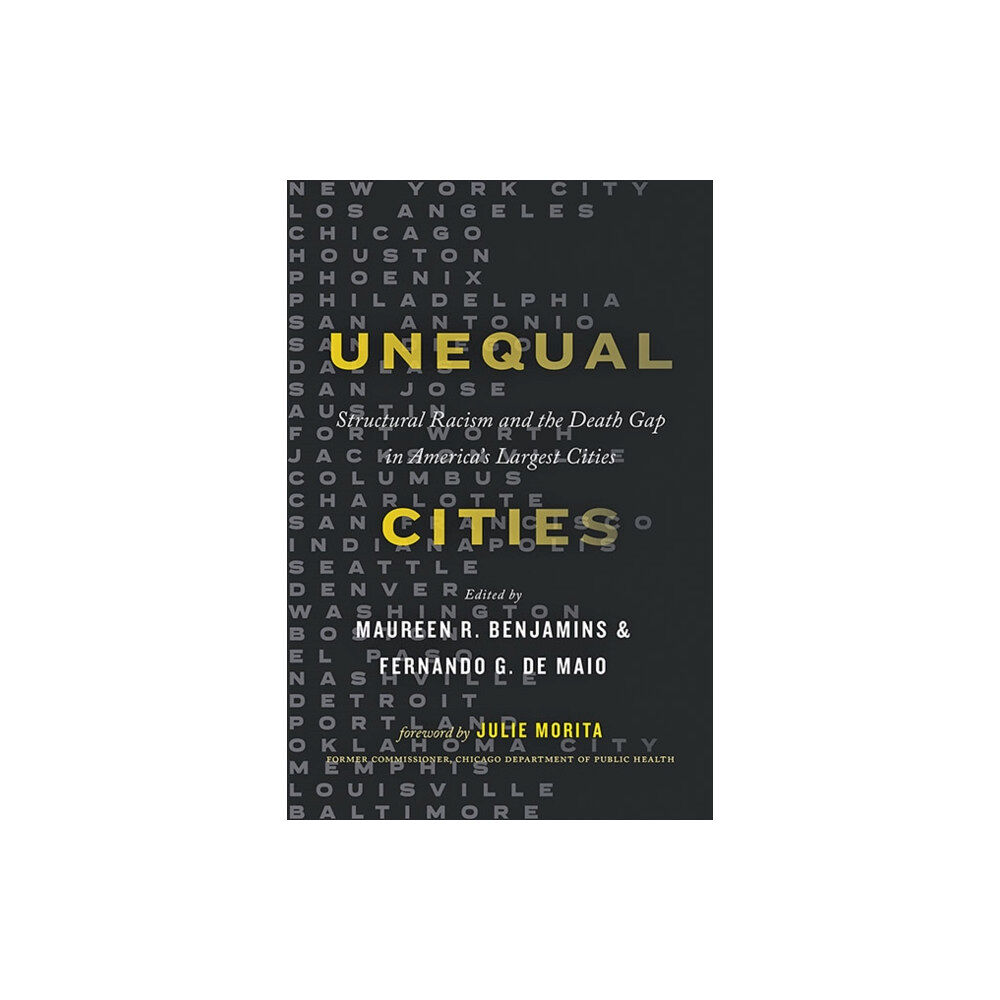- Hem
- Böcker
- Kurslitteratur
- Vård, Omsorg & Medicin
- Unequal Cities (inbunden, eng)

Unequal Cities (inbunden, eng)
Across the United States, Black people have shorter life expectancies than white people—reflecting structural racism and deep-rooted drivers...
489 kr
535 kr
Slut i lager
- Fri frakt
Fri frakt över 299:-
Snabb leverans
Alltid låga priser
Produktbeskrivning
Across the United States, Black people have shorter life expectancies than white people—reflecting structural racism and deep-rooted drivers of population health. But are some cities more equal than others?The elimination of racial and ethnic inequities—differences that are avoidable, unnecessary, and unfair—has been one of the overarching health-related goals of the United States for decades.
Yet dramatic differences in health outcomes between Black people and white people persist, rooted in structural and social determinants of health. Nationally, a Black baby can expect to live four years less than a white baby. But mortality outcomes and inequities vary widely across cities.
In Washington, DC, for example, the average life expectancy for Blacks is twelve years less than that of whites. But in other cities, mortality differences between races are less striking or nonexistent. If health equity can be achieved in some cities, why not all? This is arguably the most important health equity issue of our time.
In Unequal Cities, Maureen R. Benjamins and Fernando G. De Maio gather a team of experts to explore these racial inequities, as well as the ten-year gap in life expectancy between our healthiest and unhealthiest big cities. Rigorous analyses give readers access to previously unavailable data on life expectancy, mortality from leading causes of death, and related Black-white inequities for the country's 30 biggest cities.
The theoretically grounded essays also explore how characteristics of cities, including their levels of income inequality and racial segregation, impact overall health and Black-white inequities. The first book to specifically examine racial health inequities within and across US cities, Unequal Cities offers a social justice framework for addressing the newly identified inequities, as well as specific case studies to help public health advocates, civic leaders, and other stakeholders envision the steps needed to improve their cities' current health outcomes and achieve racial equity.
A powerful call to action for health equity advocates and city leaders alike, this book is essential reading. Contributors: David Ansell, Darlene Oliver Hightower, Jana Hirschtick, Sharon Homan, Ayesha Jaco, Emily LaFlamme, Brittney S. Lange-Maia, Kristin Monnard, Nikhil G.
Prachand, Pamela T. Roesch, Michael Rozier, Nazia Saiyed, Eve Shapiro, Abigail Silva, Veenu Verma, the West Side United Metrics Working Group, Ruqaiijah Yearby
Yet dramatic differences in health outcomes between Black people and white people persist, rooted in structural and social determinants of health. Nationally, a Black baby can expect to live four years less than a white baby. But mortality outcomes and inequities vary widely across cities.
In Washington, DC, for example, the average life expectancy for Blacks is twelve years less than that of whites. But in other cities, mortality differences between races are less striking or nonexistent. If health equity can be achieved in some cities, why not all? This is arguably the most important health equity issue of our time.
In Unequal Cities, Maureen R. Benjamins and Fernando G. De Maio gather a team of experts to explore these racial inequities, as well as the ten-year gap in life expectancy between our healthiest and unhealthiest big cities. Rigorous analyses give readers access to previously unavailable data on life expectancy, mortality from leading causes of death, and related Black-white inequities for the country's 30 biggest cities.
The theoretically grounded essays also explore how characteristics of cities, including their levels of income inequality and racial segregation, impact overall health and Black-white inequities. The first book to specifically examine racial health inequities within and across US cities, Unequal Cities offers a social justice framework for addressing the newly identified inequities, as well as specific case studies to help public health advocates, civic leaders, and other stakeholders envision the steps needed to improve their cities' current health outcomes and achieve racial equity.
A powerful call to action for health equity advocates and city leaders alike, this book is essential reading. Contributors: David Ansell, Darlene Oliver Hightower, Jana Hirschtick, Sharon Homan, Ayesha Jaco, Emily LaFlamme, Brittney S. Lange-Maia, Kristin Monnard, Nikhil G.
Prachand, Pamela T. Roesch, Michael Rozier, Nazia Saiyed, Eve Shapiro, Abigail Silva, Veenu Verma, the West Side United Metrics Working Group, Ruqaiijah Yearby
| Format | Inbunden |
| Omfång | 336 sidor |
| Språk | Engelska |
| Förlag | Johns Hopkins University Press |
| Utgivningsdatum | 2021-11-02 |
| ISBN | 9781421440996 |
Specifikation
Böcker
- Inbunden, 336, Engelska, Johns Hopkins University Press, 2021-11-02, 9781421440996
Leverans
Vi erbjuder flera smidiga leveransalternativ beroende på ditt postnummer, såsom Budbee Box, Early Bird, Instabox och DB Schenker. Vid köp över 299 kr är leveransen kostnadsfri, annars tillkommer en fraktavgift från 29 kr. Välj det alternativ som passar dig bäst för en bekväm leverans.
Betalning
Du kan betala tryggt och enkelt via Avarda med flera alternativ: Swish för snabb betalning, kortbetalning med VISA eller MasterCard, faktura med 30 dagars betalningstid, eller konto för flexibel delbetalning.
Specifikation
Det finns tyvärr inga specifikationer att visa för denna produkt.
